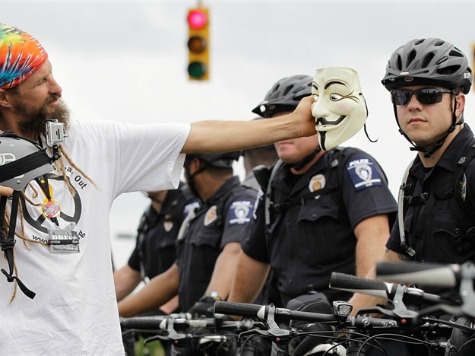
Last week Breitbart News reported the Community Relations Service of the Department of Justice deployed field representatives to mediate tensions between the police and Occupy protesters at the RNC. This week, Community Relations Service reps were back in the streets among the Occupiers and anarchists protesting the DNC.
Rodney Monroe, Charlotte Chief of Police, told Breitbart News that the DOJ “just sent them” without any request from the city. DOJ/CRS agents at the convention claimed they were tasked to support and work with police during the protests.
In a response to Breitbart News’s report, the DOJ stated:
Personnel from the U.S. Department of Justice Community Relations Service (CRS) are currently present in Tampa, Fla., during the Republican National Convention, and will also be present next week in Charlotte, N.C., during the Democratic National Convention. CRS has had a prior presence in cities who have hosted major party conventions, including in 2000, 2004 and 2008, to help facilitate solutions to potential disputes that may arise during the conventions. Acting as an impartial third-party, CRS works closely with community-based organizations, civil and human rights organizations, local governments and law enforcement officials and provides various forms of mediation and conciliation services to help alleviate any tensions that occur.
This is curious, as the CRS was created under the 1964 Civil Rights Act in an effort to ease racial tensions during the civil rights movement.
The Civil Rights Act of 1964 states:
It shall be the function of the Service to provide assistance to communities and persons therein in resolving disputes, disagreements, or difficulties relating to the discriminatory practices based on race, color, or national origin which impair the rights of persons in such communities under the Constitution or laws of the United States or which affect or may affect interstate commerce.
The Service may offer its services in cases of such disputes, disagreements, or difficulties whenever, in its judgment, peaceful relations among the citizens of the community involved are threatened thereby, and it may offer its services either upon its own motion or upon the request of an appropriate State or local official or other interested person. (42 U.S.C. 2000g-1)
It wasn’t until the passage of the Matthew Shephard and James Byrd, Jr. Hate Crimes Prevention Act and the 2010 National Defense Authorization Act that the scope of the CRS’s authority was expanded beyond racial issues to encompass other sensitive issues, such as the actual or perceived race, color, religion, or national origin of any person.
The CRS’s mission statement says:
CRS facilitates the development of viable, mutual understandings and agreements as alternatives to coercion, violence, or litigation. It also assists communities in developing local mechanisms, conducting training, and other proactive measures to prevent racial/ethnic tension and violent hate crimes committed on the basis of actual or perceived race, color, national origin, gender, gender identity, sexual orientation, religion, or disability.
The CRS’s mission statement, along with the law describing the authorities of the CRS, certainly make no mention to mediating between ideologically-oriented protesters and local police. Groups such as the National Lawyers Guild and ACLU already attend almost every protest action initiated by the institutional left or the Occupy movement.
So if the city of Charlotte did not request assistance from the DOJ’s Community Relations Service and accompanying anarchist protesters to demonstrations is not part of the CRS’s official responsibilities, why did the Department of Justice deploy these field representatives to intervene in the RNC and DNC protests?

COMMENTS
Please let us know if you're having issues with commenting.